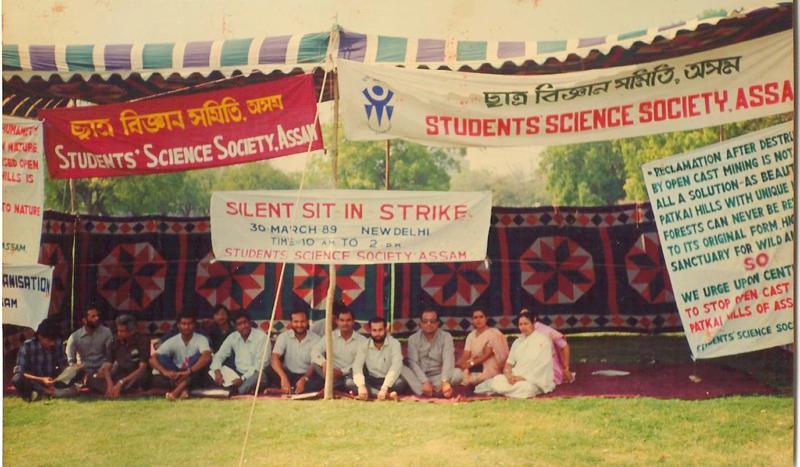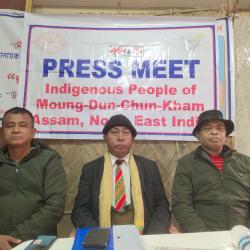A subsidiary of the central ministry of coal in Assam is steadily refusing to compensate for crop damages wrought by its open-cast mining. This is after the Gauhati High Court told the company to pay compensation of more than Rs 4 crore in its January 2007 order. The North Eastern Coalfields (NEC), an arm of Coal India Limited, in April appealed to the court against its order; the matter is pending. The January decision was in response to a July 2005 petition by landowners affected by the mining operations near Margherita town in Tinsukia district.
Opposition to open-cast mining is quite old. NEC took over the mine in 1973 from the uk-based Assam Railways and Trading Company. In 1985, it switched from underground mining to open-cast mining, despite protest from residents and the state environment ministry. Discharge of acidic effluents from excavated pits has damaged the water sources, while coal particles have rendered large farming areas unproductive. The pollution control authorities issued NEC a closure notice.
Several tribes have made their home in the Patkai hills, which form a natural border with Myanmar, and are very fertile and biodiversity. The hills also have coal—not ordinary coal but that with high calorific value and low ash content, rating with the best in the world, the only disadvantage being its high sulphur content. Most coal found in India is of low quality with high ash content.
Open-cast mines are cheaper to run, have fewer accidents and yield more than underground mines. But they destroy the environment, leaving large scars instead of fertile fields and forests. Neighboring areas are also polluted with vast quantities of overburden. Later, these are dumped on low-lying arable lands or on the hill slopes. The overburden gets washed away with rains, joins streams and channels and ends up at the Buridehing River causing severe water pollution.
According to the agriculture department, over 100 hectares (ha) has been affected, while over 30 ha has become a wasteland due to the deposition of coal particles. "Production has declined sharply. Earlier if the production was 18 tonnes per hectares of rice, today it is not more than 8-9 tonnes per hectare,' said agriculture department official Sonadhan Singh.
Jadav Das, once a prosperous farmer, is heavily indebted. Almost half of his 2.4 ha has been affected by coal deposits. Earlier this year, he started a roadside eatery but he earns only up to Rs 50 per day. "My land's fertility is lower and I have to use urea now.'
Narayan Pradhan, another resident, has other complaints. The fishery he established with a bank loan is damaged by the but the acidic, contaminated water from NEC. He has defaulted on his repayment, and gets regular reminders from the bank. "I approached NEC but they never helped me', said Pradhan.
A senior soil microbiologist had tested the soil in and around the open-cast mines and found the ph level alarmingly high. In areas as far as 5.5 km from the mine, the ph was found to be 2.98. In other nearby areas, the ph level ranged between 1.96 and 8.13.
The health condition in Margherita has also reached an alarming stage with cases of tuberculosis (tb), liver cirrhosis, allergy and asthma on the rise. The most alarming is perhaps the sharp rise in cases of tuberculosis. Government hospital data shows in 2006, Margherita had more than 450 cases of tb, both among mine workers and the general public. "Many working in the open-cast mines have tb. Body resistance decreases due to pollution and vulnerability to tb increases,' said Lakhyajyoti Gogoi, an official at the Margherita hospital. Saurav Bhaumik, a territory manager of a biological products company, says the demand of Coscopin, a medicine for respiratory disease, is in very high in Margherita.
Protests against NEC's open-cast mines have been futile. The Students’ Science Society, Assam, Purbanchal Welfare Organisation (PWO) and the Assam Council for Environmental Protection had first raised their voice against environmental degradation by the mines. Several pleas to state and central governments brought no change.
In 1989 Parag Chaliha, parliamentarian from Assam, had questioned Z R Ansari, the then Union minister of environment and forests ( MOEF), in parliament, regarding the environmental damages. Ansari said they were aware of the hazards of open-cast mining in Margherita and were against it. "If experts say that only open-cast mining is possible in the area, only then will we agree to it,' Ansari had said. moef had constituted a committee to evaluate the environmental degradation. Its 1989 report suggested NEC stop mining operations in Tikak open-cast mines in Baragolai collieries within six months. NEC was also directed to make arrangements for ‘neutralising' the pits at all its mines and assess the damages caused and compensate the affected. None of the recommendations were followed. NEC closed down for a short period but resumed soon after. By then the protests had lost momentum. I (Mowsam Hazarika, then Advisor, Students’ Science Society, assam) was threatened, one of our drivers was kidnapped, and our camera and other stuff were stolen. We were worn out . Pradyut Bardaloi, the local mla, who is also the present state industry minister, said they had set up strict guidelines for NEC. "I met the Union coal minister on May 29, 2007, and gave him a letter requesting him to intervene and to take adequate measures to arrest the ill effects of open cast mining caused by NEC,' he said.
NEC has its arguments worked out. They talk of fraudulent cases in which farmers spread coal in their fields to claim compensation. Farmers laugh at the idea. "The value of our land is in lakhs of rupees. We'd be foolish to spoil our land for a few thousand rupees in damages,' said Premo Bardaloi, an affected farmer.
NEC officials deny water pumped out of the mines flowed out into the river and the fields. But in 1987, the then officer in-charge of the environment management planning cell, had acknowledged that water from the mine did flow into the river: "There is no question of pollution of the river as the amount of water pumped out of the mines is small when compared to the volume flowing in the river.'
NEC officials said they were planting about 100,000 trees to preserve the environment, although they knew the saplings survival rate was less than 40 per cent in the absence of top soil and the presence of high sulphur content.
There are claims that open-cast mining is globally accepted, just that the guidelines haven't been followed in Margherita. "NEC just wants to extract coal and mint money. The people don't concern them,' said then parliamentarian Sarbananda Sonowal.
The Assam Pollution Control Board has also expressed concern over the violation of norms by the open-cast mines. Its officials inspected the area in September 2006 and wrote to NEC general manager about the violations. The acidic mine water required immediate treatment, huge overburdens were dumped carelessly, coal yard was not maintained properly the water from the mine was polluting waterbodies and paddy fields, said Jawahar Lal Dutta, the board's chairperson. "We had given them six months. They have not replied as yet. We will make another inspection and if they aren't following the required norms and guidelines, we will serve them a closure notice,' he said.
The Centre has provided no relief. Instead, Prime Minister Manmohan Singh, Rajya Sabha member from Assam, announced in January 2006 a Rs 3,000-crore aid for the modernisation of open-cast mining in the region.
NEC plans to expand its business and start another open-cast mine in Ledo this year, and new mines in Nagaland, Meghalaya and Arunachal Pradesh. "There is a demand of 12.11 million tonnes of coal, so we have to set up more open-cast mines. Currently, the annual production is 1.1 million tonnes, of which 9.5-10 lakh tonnes is from open cast mines and the rest from underground', says Debasis Sarkar, additional general manager of NEC.
Amarjyoti Borah
- Add new comment
- 20141 reads










Comments
Pages
Add new comment